莎士比亚十四行诗29
莎士比亚最经典的九首十四行诗,一生至少要读一次!

莎士比亚最经典的九首十四行诗,一生至少要读一次!威廉·莎士比亚,是英国文学史上最杰出的戏剧家,也是欧洲文艺复兴时期最重要、最伟大的作家,全世界最卓越的文学家之一。
莎士比亚流传下来的作品包括39部戏剧、154首十四行诗、两首长叙事诗。
今天就来欣赏下莎士比亚的十四行诗!1. 宁可卑劣宁可卑劣,也不愿负卑劣的虚名,当我们的清白蒙上不白之冤,当正当的娱乐被人妄加恶声,不体察我们的感情,只凭偏见。
为什么别人虚伪淫猥的眼睛有权赞扬或诋毁我活跃的血?专侦伺我的弱点而比我坏的人为什么把我认为善的恣意污蔑?我就是我,他们对于我的诋毁只能够宣扬他们自己的卑鄙:我本方正,他们的视线自不轨;这种坏心眼怎么配把我非议?除非他们固执这糊涂的邪说:恶是人性,统治着世间的是恶。
2. 爱是亘古长明的灯塔我绝不承认两颗真心的结合,会有任何障碍;爱算不得真爱,若是一看见人家改变便转舵,或者一看见人家转弯便离开。
哦,绝不!爱是亘古长明的灯塔,它定睛望着风暴却兀不为动;爱又是指引迷舟的一颗恒星,你可量它多高,它所值却无穷。
爱不受时光的播弄,尽管红颜和皓齿难免遭受时光的毒手;爱并不因瞬息的改变而改变,它巍然矗立直到末日的尽头。
我这话若说错,并被证明不确,就算我没写诗,也没人真爱过。
3. 我怎么能够把你来比作夏天怎么能够把你来比作夏天?你不独比它可爱也比它温婉狂风把五月宠爱的嫩蕊作践,夏天出凭的期限由未免太短天上的眼睛有时照得太酷烈它那炳耀的金颜又常遭掩蔽被机缘或无常的天道所摧折,没有芳艳不终于凋残或销毁但是你的长夏永远不会凋落也不会损失你这皎洁的红芳或死神夸口你在他的影里漂泊当你在不朽的诗里与时同长只要有人类,或人有眼睛,这诗将长存,并赐给你生命。
4. 你的爱怜抹掉那世俗的讥谗你的爱怜抹掉那世俗的讥谗,打在我额上的耻辱的烙印;别人的毁誉对我有什么相干,你既表扬我的善又把恶遮隐!你是我整个宇宙,我必须努力从你的口里听取我的荣和辱;我把别人,别人把我,都当作死,谁能使我的铁心肠变善或变恶?别人的意见我全扔入了深渊,那么干净,我简直像聋蛇一般,凭他奉承或诽谤都充耳不闻。
浅析莎士比亚第二十九首十四行诗
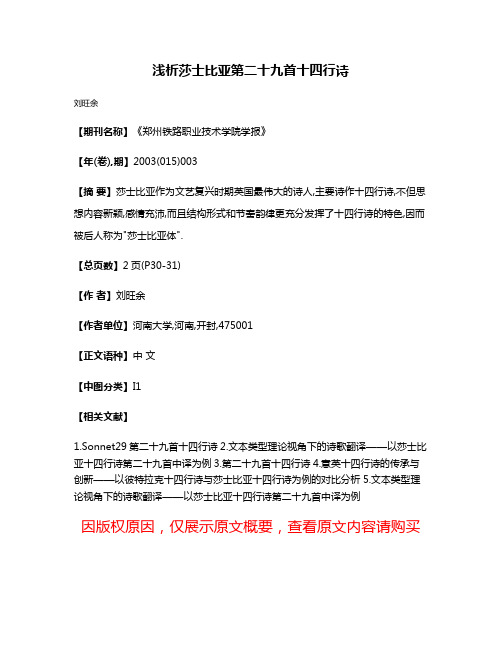
浅析莎士比亚第二十九首十四行诗
刘旺余
【期刊名称】《郑州铁路职业技术学院学报》
【年(卷),期】2003(015)003
【摘要】莎士比亚作为文艺复兴时期英国最伟大的诗人,主要诗作十四行诗,不但思想内容新颖,感情充沛,而且结构形式和节奏韵律更充分发挥了十四行诗的特色,因而被后人称为"莎士比亚体".
【总页数】2页(P30-31)
【作者】刘旺余
【作者单位】河南大学,河南,开封,475001
【正文语种】中文
【中图分类】I1
【相关文献】
1.Sonnet29第二十九首十四行诗
2.文本类型理论视角下的诗歌翻译——以莎士比亚十四行诗第二十九首中译为例
3.第二十九首十四行诗
4.意英十四行诗的传承与创新——以彼特拉克十四行诗与莎士比亚十四行诗为例的对比分析
5.文本类型理论视角下的诗歌翻译——以莎士比亚十四行诗第二十九首中译为例
因版权原因,仅展示原文概要,查看原文内容请购买。
莎士比亚29首诗鉴赏
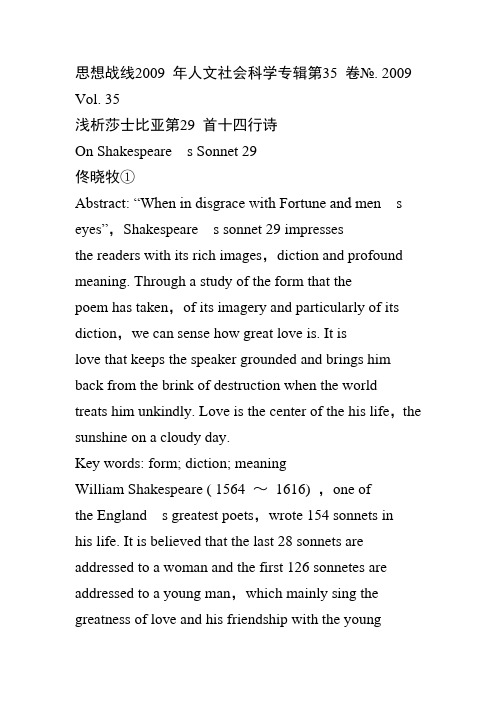
思想战线2009 年人文社会科学专辑第35 卷№. 2009 Vol. 35浅析莎士比亚第29 首十四行诗On Shakespeare s Sonnet 29佟晓牧①Abstract: “When in disgrace with Fortune and men s eyes”,Shakespeare s sonnet 29 impressesthe readers with its rich images,diction and profound meaning. Through a study of the form that thepoem has taken,of its imagery and particularly of its diction,we can sense how great love is. It islove that keeps the speaker grounded and brings him back from the brink of destruction when the world treats him unkindly. Love is the center of the his life,the sunshine on a cloudy day.Key words: form; diction; meaningWilliam Shakespeare ( 1564 ~1616) ,one ofthe England s greatest poets,wrote 154 sonnets inhis life. It is believed that the last 28 sonnets are addressed to a woman and the first 126 sonnetes are addressed to a young man,which mainly sing the greatness of love and his friendship with the youngman. Sonnet 29 is one of them. This sonnet impresses me most with its rich images,diction and profound meaning. Through a study of the form that thepoem has taken,of its imagery and particularly of its diction,we can sense how great the love is. It islove that keeps the speaker grounded and brings him back from the brink of destruction when the world treats him unkindly. Love is the center of the hislife,the sunshine on a cloudy day.Stylistically,it is a typically Shakespearian inits form. It is written in iambic pentameter,usingthe rhyme scheme a b a b,c d c d,e f e f in thefirst twelve lines and then concludes it with a rhyming couplet g g. For this sonnet,the first eightlines,which begins with“when”,establish a conditional argument and show the poet s frustration withhis craft. The third quatrain,beginning with“yet”similar to other sonnets “But”,and resolving the conditional argument,presents a splendid image of a morning lark that“sings hymns at heaven s gate. ”This image epitomizes the poet s delightful memoryof his friendship with the youth and compensates forthe misfortune he has lamented. And then,the ending couplet sums up the meaning of the sonnet. Thisis the convention of logical and rhetorical organization that governs Shakespearian sonnets,namely“a structure of two parts laid over four. The two partsare the three quatrains,on the one hand,and the concluding or revolving couplet,on the other. ”Soin most Shakespearian sonnets,“The turn normally occurs at the beginning of line 13. Each of the quatrains should serve in its own way to complicate the situation or to advance the dilemma which is the couplet s b usiness to resolve. ”It is through the choice of the structure that the poet hints that themost important part of the sonnet is not in his depression and anxiety presented in the quatrains. Instead,it lies in the final independently rhymed couplet,the last two lines which help bring about theturn and also the climax of the poem.While moving from quatrain to quatrain,wemay be also impressed by its rich imagery. The image brought about in lines 9 ~12 are critical pointsin the sonnet as it changes the focus of the sonnet.The first portion of the sonnet focuses on a great dealof challenge and misfortune. Yet,through the invocation of the love subject of the speaker,we begin tosee how the power and redemptive spirit of love canbe transformative. The simile which helps to evokethis would be the use of the bird. When Shakepeare ·37·①作者简介: 佟晓牧,云南大学大学外语教学部讲师( 云南昆明,650091) 。
莎士比亚第29首14行诗

莎士比亚第29首14行诗Sonnet 29When in disgrace with fortune and men's eyes 我的命运乖舛,常常遭受到别人的白眼I all alone beweep my outcast state,只能独自哭泣,被人抛弃,孤立无援And trouble deaf heaven with my bootless cries, 向苍天呼号,苍天也装聋作哑And look upon myself, and curse my fate,我妄自菲薄,只能诅咒命运的簸颠Wishing me like to one more rich in hope,我总希望能像别人那样,心想事成Featur'd like him, like him with friends possess'd, 像别人高朋满座,日夜承欢Desiring this man's art, and that man's scope,如他们才华横溢,见多识广With what I most enjoy contented least;这些都是我神往的啊,但我所得到的却少得可怜Yet in these thoughts myself almost despising,当我想到这些,感到绝望的时候Haply I think on thee,—and then my state,困境之中,猛然显现出你的容颜Like to the lark at break of day arising我就像一只云雀破晓展翅高飞From sullen earth, sings hymns at heaven's gate; 从五浊恶世唱飞到天堂门边For thy sweet love remember'd such wealth brings 忆想到你的甜蜜的爱是多么的幸福啊That then I scorn to change my state with kings. 即使是皇位,我也鄙换命运乖舛遭白眼我独哭泣孤无援似聋苍天厌我号妄自菲薄咒运艰我羡别人常如愿羡人高朋满座欢才华横溢见识广此皆我悦却得鲜当我绝望思如斯困境猛现你容颜我如云雀破晓飞浊世唱飞天门边忆你甜爱多幸福纵然皇位我鄙换注释一、第五句Wishing me like to one more rich in hope前人译例1:愿自己像某人之前途前人译例2:愿我和另一个一样富于希望这里一个关键词“hope”,词典中有:所希望的事物,而不是我们常有的概念“希望”,二者有本质的不同。
(完整word版)莎士比亚_sonnet_29的中文翻译及评析
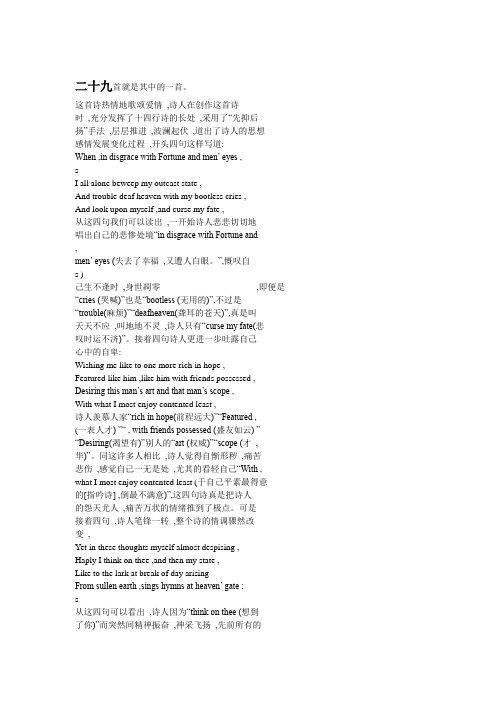
二十九首就是其中的一首。
这首诗热情地歌颂爱情,诗人在创作这首诗时,充分发挥了十四行诗的长处,采用了“先抑后扬”手法,层层推进,波澜起伏,道出了诗人的思想感情发展变化过程,开头四句这样写道:When ,in disgrace with Fortune and men’ eyes ,sI all alone beweep my outcast state ,And trouble deaf heaven with my bootless cries ,And look upon myself ,and curse my fate ,从这四句我们可以读出,一开始诗人悲悲切切地唱出自己的悲惨处境“in disgrace with Fortune and,men’ eyes (失去了幸福,又遭人白眼。
”,慨叹自s )己生不逢时,身世凋零,即便是“cries (哭喊)”也是“bootless (无用的)”,不过是“trouble(麻烦)”“deafheaven(聋耳的苍天)”,真是叫天天不应,叫地地不灵,诗人只有“curse my fate(悲叹时运不济)”。
接着四句诗人更进一步吐露自己心中的自卑:Wishing me like to one more rich in hope ,Featured like him ,like him with friends possessed , Desiring this man’s art and that man’s scope ,With what I most enjoy contented least ,诗人羡慕人家“rich in hope(前程远大)”“Featured ,(一表人才) ”“ , with friends possessed (盛友如云) ” “Desiring(渴望有)”别人的“art (权威)”“scope (才, 华)”。
同这许多人相比,诗人觉得自惭形秽,痛苦悲伤,感觉自己一无是处,尤其的看轻自己“With , what I most enjoy contented least (于自己平素最得意的[指吟诗] ,倒最不满意)”,这四句诗真是把诗人的怨天尤人,痛苦万状的情绪推到了极点。
莎士比亚十四行诗第29首

以下是莎士比亚《十四行诗第二十九首》的原文及赏析:我一旦失去了幸福,又遭人白眼,
就独自哭泣,怨人家把我抛弃,
白白地用哭喊来麻烦聋耳的苍天,
又看看自己,只痛恨时运不济,
愿自己象人家那样:或前程远大,
或一表人才,或胜友如云广交谊,
想有这人的权威,那人的才华,
于自己平素最得意的,倒最不满意;
但在这几乎是看轻自己的思想里,
我偶尔想到了你呵,——我的心怀
顿时象破晓的云雀从阴郁的大地冲上了天门,歌唱起赞美诗来;我记着你的甜爱,就是珍宝,教我不屑把处境跟帝王对调。
(屠岸译)。
莎士比亚与十四行诗29

10. Haply I think on thee, and then my state,
Haply = by chance, by a happy stroke of luck; my state = my mental state, with a suggestion also that his fortune, or the state of affairs in which he finds himself, improves.
3. And trouble deaf heaven with my bootless cries
deaf heaven - Heaven (God) turns a deaf ear to his complaints and laments. The parallel is drawn with Job in the Old Testament, who was cast out on a dung heap and bewept his mournful state. bootless = to no avail, achieving nothing.
9. Yet in these thoughts my self almost despising,
in these thoughts = while I am engaged in these thoughts; myself almost despising - and almost considering myself to be despicable for being so cast down.
13. For thy sweet love remembered such wealth brings
莎士比亚sonnet29分析

胡紫璐1118100145外国语119班2014年5月16日To: ZengchaoExplication de texteWilliam Shakespeare, Sonnet 29When in disgrace with fortune and men's eyesI all alone beweep my outcast state,And trouble deaf heaven with my bootless cries,And look upon myself, and curse my fate,Wishing me like to one more rich in hope,Featured like him, like him with friends possessed,Desiring this man's art, and that man's scope,With what I most enjoy contented least;Y et in these thoughts myself almost despising, ,Haply I think on thee—and then my state,Like to the lark at break of day arisingFrom sullen earth, sings hymns at heaven's gate;For thy sweet love remembered such wealth bringsThat then I scorn to change my state with kings.Ⅰ.1.Brief IntroductionWilliam Shakespeare(1564-1616) is a famous and outstanding writer, dramatist and poet in British literature history, who contributes a lot during the Renaissance period. He wrote 37 plays and 154 sonnets and some long narrative poems. Henry Howard, Earl of Surrey gave the sonnet its English form first ,and Shakespeare used it, thus usually called the Shakespearean sonnet. Shakespeare’s sonnets was published in 1609, which are a collection of 154 sonnets. Sonnet 29 is one of the best-know sonnets in the collection.2.ParseWhen I am out of favor with Goddess of fortune and men, all alone I weep over my condition of being ignored by society, and cry useless for it to heaven, and think about myself, cursing my fate, wishing I like someone full of hope, wishing i am beautiful and have a lot of friends like him, desiring his accomplishment and range of learning, and I am least contented with what I am best at; but when I despise myself with thesethoughts, I , by chance,think of you-- and then my state of mind, like the lark at the break of day, flying from the sullen earth, singing hymns to God; for remembering the wealth that your sweet love brings to me, i will nerver chang my position with kings.Ⅱ.Form1.This sonnet contains fourteen lines of iambic pentameter rimed abab cdcd efef gg, with an exception of imperfectness in the 6th line and 8th line rhyming in “possessed” and “least”.2.The sonnet is constructed from three quatrains, which are four-line stanzas, and a final heroic couplet. There is a turn between the three quatrain and the couplet, in which the mood of the poem shifts, and the poet express the real theme of the poem. This sonnet do no have much rhetoric. Poet just expresses his thoughts directly. In the 8th line poet uses paradox when he claims the thing he enjoy most or he is best at cannot makes him happy comparing with others. In the 10th line poet uses simile to tell how happy he is if there is “your” love.Ⅲ.Content1.ThemeThe theme of the poem is love. We can feel the poet’s sadness through the 1st to 8th line. He feels unlucky, shamed and jealous those are successful, welcomed, but when he remind himself that he have love from “you”, he believes he is happier than kings.2.EvaluationThis is a inspiring poem. In the poem, “I”am poor and despised by God and men, but with love, “I” have greatest wealth. This poem shows the feature of the Renaissance period which concerned human’s feeling. In the poem, God do not help “me” out of trouble, but love can give“me”everything.。
莎士比亚十四行诗中描述爱情的

爱情一直是文学作品中最为重要的主题之一,而莎士比亚的十四行诗则被公认为是最传世的爱情诗篇之一。
在这些十四行诗中,莎士比亚用精湛的词藻和丰富的想象描绘了爱情的甜美、苦涩和复杂。
本文将从多个角度深入探讨莎士比亚十四行诗中对爱情的刻画。
一、甜美的爱情莎士比亚的十四行诗中,最为经典的甜美爱情描写莫过于《十四行诗集》中的第18首和第116首。
在第18首中,诗人借助春天和夏天的美丽景色,表达了他对爱人的深情厚爱。
莎士比亚用“你的永恒之夏将永不凋零”这样的诗句,将爱人与美好的自然景色相提并论,给人一种甜蜜温馨的感受。
而在第116首中,莎士比亚则以更加理性的方式来描述爱情。
他认为真正的爱情是永恒不变的,是超越时间、疾病和命运的。
莎士比亚的这种理性的爱情观,给人以更加深远的思考和启发。
二、苦涩的爱情除了甜美的爱情,莎士比亚的十四行诗中还有许多关于苦涩爱情的描写。
比如《十四行诗集》中的第138首,诗中所述的爱情不再像第18首和第116首中那样美好和甜蜜,而是真实的有血有肉、有瑕疵的。
莎士比亚诗中写到:“我知道你的缺点,但我还是爱你”,这句话真实地展现了一种苦涩的爱情观。
另外,《十四行诗集》中的第147首也是关于苦涩爱情的描述。
诗人在诗中借助医学的比喻,描述了一种痛苦的爱情。
这种爱情看似美好,实则却充满了痛苦和折磨。
莎士比亚通过这些诗篇,将爱情的复杂性体现得淋漓尽致,给人带来许多思考。
三、复杂的爱情莎士比亚的十四行诗中,还有许多描绘爱情的诗篇是关于复杂的爱情。
比如《十四行诗集》中的第29首,诗人在诗中通过对贫困和命运的反思,描绘了一种有着复杂情感的爱情。
这种爱情既有甜蜜的时刻,也有痛苦的时刻,让人感受到爱情的复杂性和真实性。
另外,《十四行诗集》中的第130首也是关于复杂爱情的描述。
诗人在诗中讲述了一位黑皮肤女士的美丽,虽然她不符合当时的审美标准,但她的内在美让诗人为之倾倒。
这种复杂的爱情观,反映了莎士比亚对于爱情的深刻理解和体悟。
sonnet 18,29
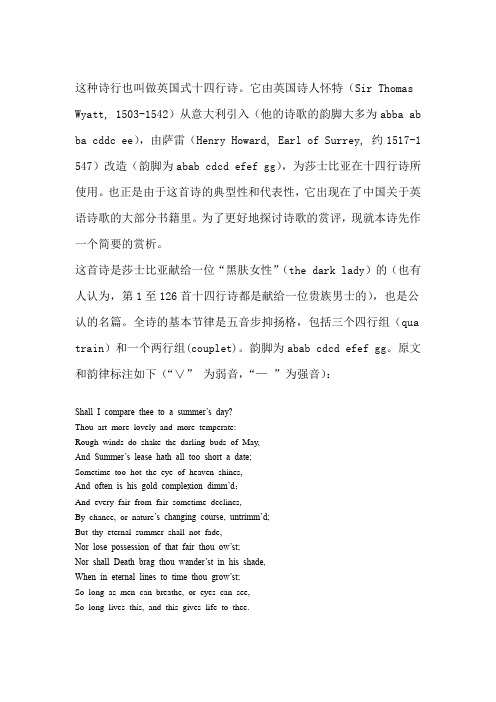
这种诗行也叫做英国式十四行诗。
它由英国诗人怀特(Sir Thomas Wyatt, 1503-1542)从意大利引入(他的诗歌的韵脚大多为abba ab ba cddc ee),由萨雷(Henry Howard, Earl of Surrey, 约1517-1 547)改造(韵脚为abab cdcd efef gg),为莎士比亚在十四行诗所使用。
也正是由于这首诗的典型性和代表性,它出现在了中国关于英语诗歌的大部分书籍里。
为了更好地探讨诗歌的赏评,现就本诗先作一个简要的赏析。
这首诗是莎士比亚献给一位“黑肤女性”(the dark lady)的(也有人认为,第1至126首十四行诗都是献给一位贵族男士的),也是公认的名篇。
全诗的基本节律是五音步抑扬格,包括三个四行组(qua train)和一个两行组(couplet)。
韵脚为abab cdcd efef gg。
原文和韵律标注如下(“∨” 为弱音,“—”为强音):Shall I compare thee to a summer’s day?Thou art more lovely and more temperate:Rough winds do shake the darling buds of May,And Summer’s lease hath all too short a date;Sometime too hot the eye of heaven shines,And often is his gold complexion dimm’d;And every fair from fair sometime declines,By chance, or nature’s changing course, untrimm’d;But thy eternal summer shall not fade,Nor lose possession of that fair thou ow’st;Nor shall Death brag thou wander’st in his shade,When in eternal lines to time thou grow’st;So long as men can breathe, or eyes can see,So long lives this, and this gives life to thee.∨—∨—∨—∨—a∨—∨—∨—∨—∨—b——∨—∨—∨—∨—a∨—∨—∨—∨—∨—b∨—∨—∨—∨—∨—c∨—∨—∨—∨—∨—d∨—∨—∨—∨—c∨—∨—∨—∨—∨—d∨—∨—∨—∨—∨—e∨—∨—∨∨∨—∨—f∨∨——∨—∨∨∨—e∨∨∨—∨—∨—∨—f∨—∨—∨—∨—∨—g∨—∨—∨—∨—g梁宗岱译文:我怎么能够把你来比作夏天?你不独比它可爱也比它温婉:狂风把五月宠爱的娇蕊作践,夏天出赁的期限又未免太短:天上的眼睛有时照得太酷烈,它那炳耀的金颜又常遭掩蔽:被机缘或无常的天道所摧折,没有芳艳不终于凋残或销毁。
sonnet29修辞手法

Sonnet 29 修辞手法引言莎士比亚的Sonnet 29(29号十四行诗)是他创作的一系列154首十四行诗中的一首。
这首诗被认为是珍贵的文学艺术品,因为它不仅表达了人类普遍的思考和情感,还展示了莎士比亚作为一个杰出的文学家的修辞技巧。
本文将探讨Sonnet 29中使用的修辞手法,包括隐喻、对偶、押韵、拟人、排比等,并分析它们对诗的意义和效果的影响。
修辞手法一:隐喻Sonnet 29中运用了丰富的隐喻,用以描述诗人内心的痛苦和自卑感。
以下是几个例子:•“When, in disgrace with fortune and men’s eyes”在这句诗中,“disgrace”(耻辱)和“fortune”(命运)通过隐喻被赋予了人类特征。
诗人的“fortune”不仅仅是摒弃自己,而且还带有遗弃和背叛的含义。
这个隐喻呈现了诗人内心的孤独和痛苦。
•“And trouble deaf heaven with my bootless cries”这个隐喻将诗人的哭泣比喻为“bootless cries”(无用的呐喊),意味着诗人的悲伤无法触动上天的心,进一步强调了诗人的自卑和无助感。
通过使用隐喻,诗人成功地将个人的痛苦情感表达出来,并使读者能够更深刻地理解诗人内心的世界。
修辞手法二:对偶Sonnet 29中频繁运用了对偶手法,通过对比和对立展示了人生的起伏和情感的波动。
以下是一些例子:•“And look upon myself, and curse my fate”•“Haply I think on thee, and then my state”在这些对偶中,诗人对比了自己内心的两种状态——自我厌恶和思念对方。
这种对比强调了诗人内心的情感起伏,将诗人的内心体验以对立的方式表达出来。
另一个例子是以下对偶:•“Yet in these thoughts myself almost despising”•“Haply I think on thee, and then my state”这个对偶表达了诗人内心的矛盾情感。
莎士比亚十四行诗赏析

莎士比亚十四行诗赏析莎士比亚十四行诗赏析汪玉枝周淳(华东师范大学外语学院上海市200062 ) 摘要:威廉?莎士比亚 ( 1564-1616 )是英国文艺复兴时期伊丽莎白时代最伟大的剧作家及杰出的诗人。
他的文学成就在英国文坛乃至世界文坛上的地位无人能及。
人们尊称他为莎翁或大文豪,他作品里所用到的词汇比英国任何一位作家都要多,并且还自创了一些词语和表达法,丰富了英语言。
其语汇表达精彩纷呈,令人目不暇及。
且不提他的剧作,单单欣赏他的十四行诗已令读者叹为观止,他的文学思想和艺术风格极大地影响了他那个时代甚至于如今的文人和文学爱好者,给了他们真、善、美的享受和心灵的启迪。
关键词:十四行诗;真、善、美;赏析;明珠一、引言莎士比亚是全世界众多读者耳熟能详的伟大的英国文艺复兴时期伊丽莎白时代的杰出剧作家。
他那广为传播的四大喜剧:《仲夏夜之梦》、《威尼斯商人》、《皆大欢喜》、和《第十二夜》以及四大悲剧:《汉姆莱特》、《奥塞罗》、《李尔王》和《麦克佩斯》可谓脍炙人口,有口皆碑。
他在英国文坛的地位犹如中国清朝的文豪曹雪芹,所以大量的莎学研究及红学研究文献曾出不穷,浩瀚如海。
但是,也有很多读者只知道莎士比亚是伟大的剧作家,却不知他还是一位在十四行诗方面无人能媲美的大诗人。
他的十四行诗大约创作于1590 年至1598 年之间,共154 首,前126 首是献给厚待他的一位金发少年,也就是骚桑普顿伯爵或宾勃鲁克伯爵;后28 首是写给一位神秘的“黑肤女郎”的。
这位黑发黑肤背叛爱情的女郎究竟是谁,为何引得诗人频频献诗于她,一直都是个谜。
至于她是真实人物还是作者的杜撰,无人能解。
莎翁诗作的结构技巧和语言技巧都很独到,几乎每首诗都有独立的审美价值。
莎士比亚在运用这个诗体时,极为得心应手,体现了他语汇丰富、用词洗练、比喻新颖、结构巧妙、音调铿锵悦耳、张弛有度等特色。
最为精妙的是全诗的最后两行,往往构思奇妙,语出惊人,既是全诗最关键的部分,又自成一联警语格言,可谓匠心独运。
浅析莎士比亚十四行诗第二十九首
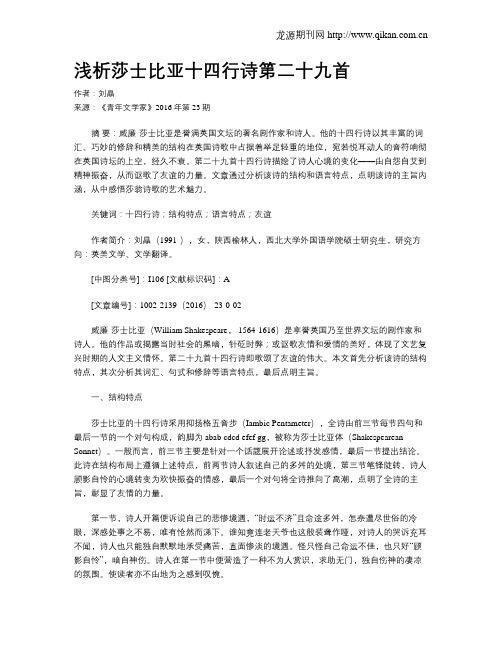
浅析莎士比亚十四行诗第二十九首作者:刘晶来源:《青年文学家》2016年第23期摘要:威廉·莎士比亚是誉满英国文坛的著名剧作家和诗人。
他的十四行诗以其丰富的词汇、巧妙的修辞和精美的结构在英国诗歌中占据着举足轻重的地位,宛若悦耳动人的音符响彻在英国诗坛的上空,经久不衰。
第二十九首十四行诗描绘了诗人心境的变化——由自怨自艾到精神振奋,从而讴歌了友谊的力量。
文章通过分析该诗的结构和语言特点,点明该诗的主旨内涵,从中感悟莎翁诗歌的艺术魅力。
关键词:十四行诗;结构特点;语言特点;友谊作者简介:刘晶(1991-),女,陕西榆林人,西北大学外国语学院硕士研究生,研究方向:英美文学、文学翻译。
[中图分类号]:I106 [文献标识码]:A[文章编号]:1002-2139(2016)-23-0-02威廉·莎士比亚(William Shakespeare, 1564-1616)是享誉英国乃至世界文坛的剧作家和诗人。
他的作品或揭露当时社会的黑暗,针砭时弊;或讴歌友情和爱情的美好,体现了文艺复兴时期的人文主义情怀。
第二十九首十四行诗即歌颂了友谊的伟大。
本文首先分析该诗的结构特点,其次分析其词汇、句式和修辞等语言特点,最后点明主旨。
一、结构特点莎士比亚的十四行诗采用抑扬格五音步(Iambic Pentameter),全诗由前三节每节四句和最后一节的一个对句构成,韵脚为abab cdcd efef gg,被称为莎士比亚体(Shakespearean Sonnet)。
一般而言,前三节主要是针对一个话题展开论述或抒发感情,最后一节提出结论。
此诗在结构布局上遵循上述特点,前两节诗人叙述自己的多舛的处境,第三节笔锋陡转,诗人顾影自怜的心境转变为欢快振奋的情感,最后一个对句将全诗推向了高潮,点明了全诗的主旨,彰显了友情的力量。
第一节,诗人开篇便诉说自己的悲惨境遇,“时运不济”且命途多舛,怎奈遭尽世俗的冷眼,深感处事之不易,唯有怆然而涕下。
Analysis of SONNET 29 莎士比亚十四行诗第29首英文赏析

The last two lines of the poem, the cautionary(警示) conclusion, are the outstanding features of Shakespeare's sonnets.
(4)
Wishing me like to one more rich in hope,
(5)
Featur'd like him, like him with friends possess'd, (6)
Desiring this man's art and that man's scope,
(7)
Structurally (结构上)
From the perspective of poetic features:
Shakespeare's poems are sonnets, and pushkin's poems have no form,
(8)
我曾经爱过你;爱情,也许, 在我的心灵里还没有完全消亡; 但愿它不会再打扰你; 我也不想再使你难过悲伤。 我曾经默默无语地,毫无指望地爱过你, 我既忍受着羞怯,又忍受着嫉妒的折磨, 我曾经那样真诚、那样温柔地爱过你,
但愿上帝保佑你, 另一个人也会像我一样地爱你。
ANALYSIS
"I loved you" was written in 1828 ,In Moscow, he met and fell in love with orienina. After a fruitless courtship with her father, he wrote the song "I loved you."
译者阐释空间——析莎士比亚十四行诗第29首的三种中译本

受十四行诗 的魅 力。
关键词 : 莎士 比亚 ; 十四行 诗 ; 分析 ; 措辞 中图分 类号 : 0 . I 62 1 文献标识码 : A 文章编号 :6 1 18 (0 0 o—0 4—0 17 — 5O 2 1 )7 l4 2
21 00年第 o 期 7 第2 6卷 ( 2 5期 ) 总 3
吉林省教育学 院学报
J UR L D AT O L sI r E OF J L N R I E O NA OF E UC I NA Di , UT I I P OV NC T
No 0 2 0 . 7,01 、0 6 rL 2
一
“ 字给读者 留下想象 的空 间, 你” 读者完全可以根据
自己的想象及 个人 体验 得 出不 同 的感 悟与解 释 。 总之 , 于这三 种译 本主题 的掌握 , 对 读者 完全可 以按照 自身的需求来欣赏、 解读诗歌。关键是 , 都能 感 受 到诗歌所 表达 的强烈 情感及 诗歌 所传达 的归一 性: 如果 是友谊 , 不是泛 泛之交 ; 这 如果 是爱情 , 也不 是 逢场作 戏 。
二、 内容 的表达
邃的意境 , 是一座难 以逾越的高峰。另一方面, 翻译 莎 士 比 亚 的 诗 时 , 要 译 文 的 文 义 不 出错 , 是 易 “ 不 事, 但更难 的是 传 达 原 诗 的风 格 , 诗 的 韵 味 。 【 原 ”2 ] 即便如此 , 十四行诗仍然吸引了众多译者 , 本文 以屠 岸、 辜正坤和艾梅所 译 的第 2 9首十 四行诗作为语 料, 从主题 、 内容、 形式 以及行尾标点方面进行对 比
莎士比亚十四行诗最经典的几首英文

莎士比亚十四行诗最经典的几首英文Shakespeare's Most Iconic SonnetsWilliam Shakespeare, a renowned figure in English literature, is renowned not only for his plays but also for his poetry, especially his sonnets. Among the 154 sonnets he penned, a few stand out as the most经典 and enduring, offering profound insights into love, life, and mortality.The first sonnet that deserves mention is Sonnet 18, widely regarded as one of the most beautiful and romantic poems in the English language. It compares his beloved to a summer's day, praising her beauty and comparing it to the fleeting beauty of summer. The poem concludes with a vow of eternal love, promising that "so long as men can breathe or eyes can see, / So long lives this, and this gives life to thee."Another noteworthy sonnet is Sonnet 29, which explores the theme of love's transformational power. Shakespeare writes about how love can transform even the most unremarkablethings into something beautiful and valuable. He compares his love to a sculptor, who takes a block of marble and carves it into a statue of beauty.Sonnet 73 delves into the concept of time and aging. Shakespeare laments the passing of time and its inevitable effects on the body, but finds solace in the idea that love, unlike physical beauty, can last forever. He writes, "That time of year thou mayst in me behold / When yellow leaves, or none, or few, do hang / Upon those boughs which shake against the cold, / Bare ruined choirs, where late the sweet birds sang."Lastly, Sonnet 116 offers a profound understanding of love's true essence. This sonnet rejects the traditional view of love as merely physical or emotional and instead defines it as an act of will, a choice to love someone despite their flaws and imperfections. Shakespeare writes, "Let me not to the marriage of true minds / Admit impediments. Love is not love / Which alters when it alteration finds, / Or bends with the remover to remove."These few sonnets are a testament to Shakespeare's mastery of language and his profound understanding of human emotions. They stand the test of time, offering insights and inspiration to readers across the globe.莎士比亚十四行诗最经典的几首威廉·莎士比亚,这位英国文学界的知名人物,不仅因其戏剧作品而广受赞誉,其诗歌作品同样引人注目,尤其是他的十四行诗。
莎士比亚 十四行诗

莎士比亚十四行诗莎士比亚十四行诗如下:1、shakespeare sonnet 12莎士比亚十四行诗when i do count the clock that tells the time,and see the brave day sunk in hideous night;when i behold the violet past prime,and sable curls all silver'd o'er with white: when lofty trees i see barren of leaves,which erst from heat did canopy the herd,and summer's green, all girded up in sheaves,born on the bier with white and bristly beard; then of thy beauty do i question make,that thou among the wastes of time must go,since sweets and beauties do themselves forsake, and die as fast as they see others grow;and nothing 'gainst time's scythe can make defence save breed, to brave him when he takes thee hence.翻译:当我数着壁上报时的自鸣钟,见明媚的白昼坠入狰狞的夜,当我凝望着紫罗兰老了春容,青丝的卷发遍洒着皑皑白雪;当我看见参天的树枝叶尽脱,它不久前曾荫蔽喘息的牛羊;夏天的青翠一束一束地就缚,带着坚挺的白须被舁上殓床;于是我不禁为你的朱颜焦虑:终有天你要加入时光的废堆,既然美和芳菲都把自己抛弃,眼看着别人生长自己却枯萎;没什么抵挡得住时光的毒手,除了生育,当他来要把你拘走。
莎士比亚十四行诗带翻译

莎士比亚十四行诗带翻译莎士比亚的十四行诗语汇丰富、用词洗练、比喻新颖、结构巧妙、音调铿锵悦耳、张弛有度,让人印象深刻。
下面是店铺为大家带来莎士比亚十四行诗带翻译,供大家阅读欣赏!莎士比亚十四行诗1Then let not winter's ragged hand deface你还没提炼出香精,那你就别让In thee thy summer ere thou be distilled.严冬的粗手来抹掉你脸上的盛夏:Make sweet some vial; treasure thou some place你教玉瓶生香吧;用美的宝藏With beauty's treasure ere it be self-killed.使福地生光吧,趁它还没有自杀。
That use is not forbidden usury取这种重利并不是犯禁放高利贷,Which happies those that pay the willing loan;它能够教愿意还债的人们高兴;That's for thyself to breed another thee,这正是要你生出另一个你来,Or ten times happier be it ten for one.或高兴十倍,要是你一人生十人;Ten times thyself were happier than thou art,你十个儿女描画你十幅肖像,If ten of thine ten times refigured thee:你就要比你独个儿添十倍欢乐:Then what could death do if thou shouldst depart,你将来去世时,死神能把你怎样,Leaving thee living in posterity?既然在后代身上你永远存活?Be not self-willed, for thou art much too fair,别刚愎自用,你太美丽了,不应该To be death's conquest and make worms thine heir.让死神掳去、教蛆虫做你的后代。
- 1、下载文档前请自行甄别文档内容的完整性,平台不提供额外的编辑、内容补充、找答案等附加服务。
- 2、"仅部分预览"的文档,不可在线预览部分如存在完整性等问题,可反馈申请退款(可完整预览的文档不适用该条件!)。
- 3、如文档侵犯您的权益,请联系客服反馈,我们会尽快为您处理(人工客服工作时间:9:00-18:30)。
When in disgrace with fortune and men's eyes
I all alone beweep my outcast state,
And trouble deaf heaven with my bootless cries, And look upon myself, and curse my fate,
Wishing me like to one more rich in hope, Featur'd like him, like him with friends possess'd, Desiring this man's art, and that man's scope, With what I most enjoy contented least;
Yet in these thoughts my self almost despising, Haply I think on thee,-- and then my state,
Like to the lark at break of day arising
From sullen earth, sings hymns at heaven's gate,; For thy sweet love remember'd such wealth brings That then I scorn to change my state with kings
当我受尽命运和人们的白眼,
暗暗地哀悼自己的身世飘零,
徒用呼吁去干扰聋瞆的昊天,
顾盼着身影,诅咒自己的生辰,
愿我和另一个一样富于希望,
面貌相似,又和他一样广交游,
希求这人的渊博,那人的内行,
最赏心的乐事觉得最不对头;
可是,当我正要这样看轻自己,
忽然想起了你,于是我的精神,
便像云雀破晓从阴霾的大地
振翮上升,高唱着圣歌在天门:
一想起你的爱使我那么富有,
和帝王换位我也不屑于屈就。
这首诗热情地歌颂爱情,诗人在创作这首诗时,充分发挥了十四行诗的长处 ,采用了“先抑后扬”手法,层层推进,波澜起伏,道出了诗人的思想感情发展变化过程。
一开始诗人悲悲切切地唱出自己的悲惨处境。
失去了幸福,又遭人白眼。
慨叹自己生不逢时 ,身世凋零。
幸福已离他远去,即便是哭喊也无用,真是叫天天不应,叫地地不灵,诗人只有悲叹时运不济。
接着四句诗人更进一步吐露自己心中的自卑,同这许多人相比, 诗人觉得自惭形秽, 痛苦悲伤, 感觉自己一无是处, 尤其的看轻自己。
诗人笔锋一转,整个诗的情调骤然改变,顿时像破晓的云雀从阴郁的大地冲上了天门,歌唱起赞美诗来。
这就是爱情,扭转了诗人心中的乾坤。
从而可以看出,诗人作这首诗经历了从消极到振奋,从忧郁到欢喜,从自卑到自豪,这一系列的变化,全都是因为爱的力量。
觉得更多的是作者那种对社会、对自己的命运的不满和无赖,虽然诗里表现得那么大无谓。
